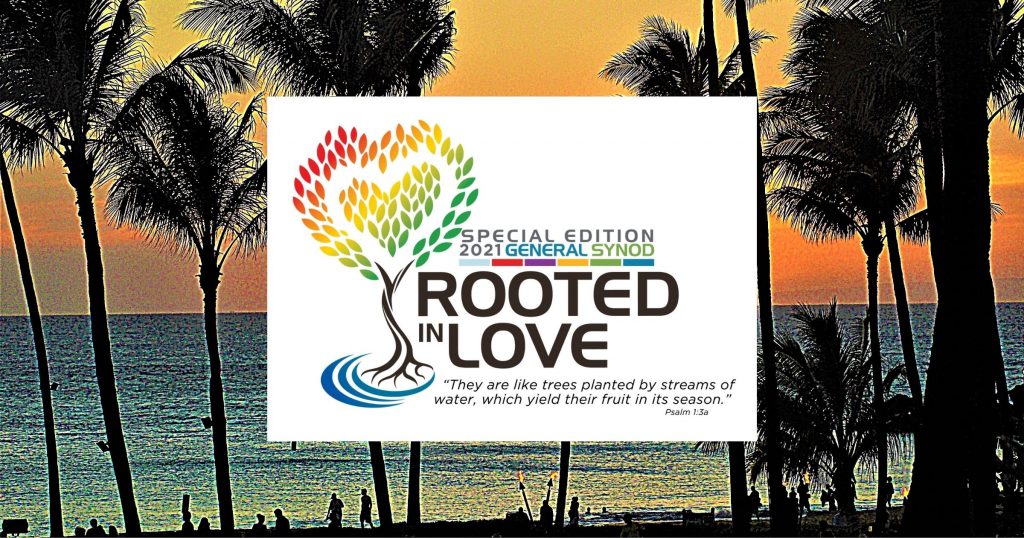Resolution on occupied Hawaii narrowly fails, despite approval of most delegates
A call for the United States to own up to its illegal occupation of Hawaii drew “yes” votes from most United Church of Christ delegates July 17 — but not enough for it to pass.
A resolution calling for an end to “128 years of war” between the U.S. and the Hawaiian Kingdom failed on a vote of 291 “yes” to 188 “no,” with 74 abstentions. The approval by 60.75 percent of voting General Synod delegates fell short of the two-thirds needed for passage.
The Synod’s work on the matter included tension, breakthroughs and amendments during a committee process, and a floor attempt to postpone action. It ended, after the vote, with General Minister and President John Dorhauer praying “for the good people of Hawaii and its native citizens who continue to bear the pain and the wounds of a colonial past whose footprint is far from gone,” and for the UCC as it “wrestles with its legacy of colonialism.”
Why illegal?
The UCC’s Association of Hawaiian Evangelical Churches brought the resolution to Synod. AHEC consists of 31 historically Native Hawaiian congregations from across Hawaii. Some 80 percent of them were founded before 1893, the year the United States took Hawaii by military overthrow.
Among the key points of their case, described here, are that:
- The overthrow created a state of war that never ended.
- The Hawaiian Kingdom never ceased to exist, even after its overthrow.
- U.S. President Grover Cleveland called the overthrow “an act of war” and “a substantial wrong” and reached what proponents consider a still-valid agreement with Hawaiian Queen Lili`uokalani to restore the Kingdom.
- The U.S. and the state government of Hawaii should be seen as occupying forces and behave as such according to international law.
- That the occupiers have committed “denationalization” and other war crimes against Native Hawaiians.
As originally written, the resolution would have called on Hawaii’s state and county leaders and the U.S. Congress — each listed separately — to “begin to comply with international humanitarian law in its prolonged and illegal occupation of the Hawaiian Islands.” It also would have asked “all United Nation member states and non-member states” to ensure U.S. compliance.
Amendments offered
In reviewing the resolution July 15 and 16, a committee of some 22 delegates — and, especially, an overnight drafting group of eight — elaborated on that. Their amended version spelled out a UCC process for issuing those calls.
It asked the UCC’s general counsel to “listen to and consider recommendations” from AHEC, “other Native Hawaiian organizations, and Native Hawaiian voices” in “drafting communications to local, national and international leaders and organizations calling for compliance with international humanitarian law and an end to the illegal occupation of the Hawaiian islands.”
The airing of opinions during that process — and the offering of a substitute resolution by another delegate from Hawaii — was especially hard for proponents from AHEC to bear.
“The work of this committee was especially challenging,” said its chair, the Rev. Marilyn Kendrix, a retired Conference minister from Southern New England. “The process that we use for resolutions at General Synod felt at times like not centering the same voices that we have historically sidelined over the centuries. And while none of us wanted to de-center those voices, we did have a task to complete. It felt like what we were doing was the very thing the resolution spoke against. I can attest to my own chagrin at feeling like the instrument of white supremacy.”
An opponent of the original resolution, in committee and on the floor, was the Rev. Kyle Lovett, a delegate from the Hawaii Conference. She argued that the resolution — though brought by AHEC according to Synod rules — did not represent all UCC Native Hawaiian voices who might disagree with parts of it. “If the UCC goes on record as asserting that the USA has been in a state of war with a Hawaiian kingdom or the Hawaiian Kingdom, the UCC is denying the opportunity” for those other voices to be heard, she said. Her motion in plenary to postpone action on the resolution was defeated — but then was followed a short time later by the defeat of the resolution itself.
‘Voted against yourselves’
In a Zoom session open to delegates and visitors shortly after the vote, Kalaniakea Wilson said white supremacy is in fact to blame for the resolution’s failure. A member of Kalapana Maunakea First Hawaiian Congregational Church in Nanawale, founded in 1823, he was AHEC’s appointed proponent at Synod. “You guys just voted against yourselves,” he said.
Wilson said the resolution’s defeat continues a pattern that has rendered the UCC’s 1993 apology for its predecessors’ roles in the overthrow meaningless. National and Conference bodies in the UCC followed up on that apology by paying millions of dollars in reparations in money and property. But Native Hawaiians, Wilson said, continue to pay the human costs of 128 years of oppression and human-rights violations, in the form of homelessness, incarceration, poor health and addiction. Failing to end these and press for enforcement of international law means the UCC is guilty of “false apologies and broken promises,” he said.
In a statement to United Church of Christ News, he blamed “an outdated educational intensive video that deliberately confused all delegates” and “misinformation and lies” spread by the resolution’s opponents.
Dorhauer’s plenary-session prayer right after the vote acknowledged the difficulty of the debate. “There are times when the honest and the expressive opinions of the many warrant a look inside our hearts and a recognition of the deep pain from which some of those voices speak,” he prayed. “This is such a moment.”
Related News
Ashes to Ashes
Some weeks more than others the sense that the “world is burning” is hard to shake. The...
Read MoreUnited Church Homes receives $15,000 in grants to expand NaviGuide services for the elderly and their families
United Church Homes (UCH), a national nonprofit senior living organization headquartered in...
Read More‘A Season for Spiritual Preparation’: Rev. Karen Georgia Thompson offers Ash Wednesday reflections
The Rev. Karen Georgia Thompson, United Church of Christ General Minister and President/CEO,...
Read More


